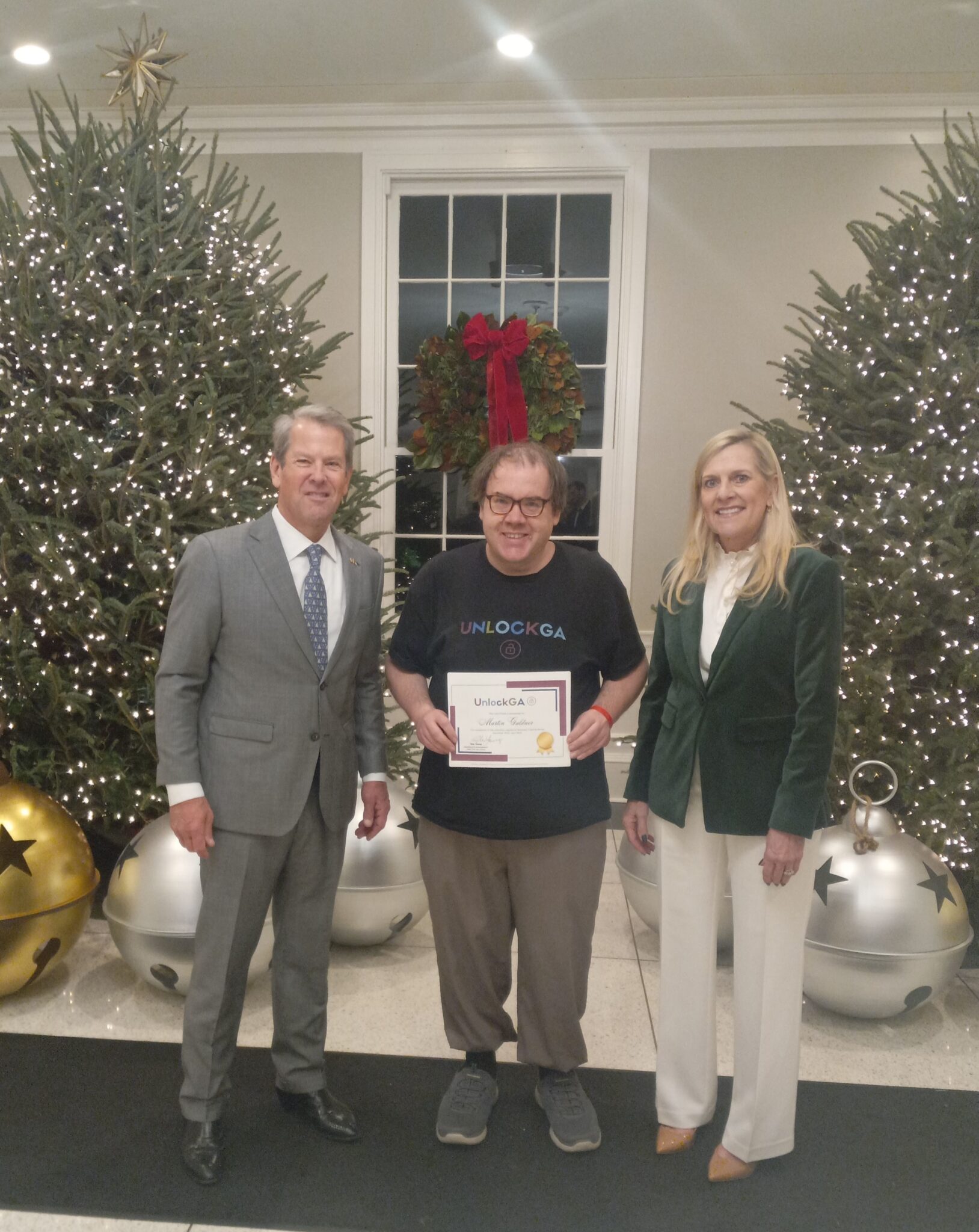From Homelessness to Advocacy
The CDC estimates that more than 5 million adults in the United States have autism spectrum disorder. It wasn’t until 2008 when Martin Guldner was 32 years old that he learned he was one of them. He wasn’t surprised.
“A lot of people who have autism have suspicion of a diagnosis,” Martin said.
Martin noticed earlier signs, including certain learning and social difficulties throughout grade school, college and employment, but becoming homeless after some challenging life events— including his mother’s death— is what led Martin to connect with people and resources that helped him navigate the process of getting diagnosed. Through his diagnosis, Martin became eligible for programs and services that enabled him to finally break a seven-year cycle of homelessness. In 2011, he was accepted into a permanent supportive housing program that CaringWorks eventually took over, and he got help from the Georgia Vocational Rehabilitation Agency.
“Having housing—a stable roof over my head, having accommodations for my disability, and being a client with Georgia Vocational Rehabilitation, all those things allowed me to get employed.”
 For eight years Martin has maintained a full-time job working with real estate tax data, and over the summer he started working several hours a week at the Connections School of Atlanta, a neurodiverse high school and transition program that serves students with autism and other sensory, motor, and communication differences. Through his journey from homelessness to stability, Martin has also become an active autism and disability advocate and volunteer. He frequently shares his testimony to encourage people in the community to support and advocate for people with disabilities, and perhaps most importantly, for those living with disabilities to advocate for themselves.
For eight years Martin has maintained a full-time job working with real estate tax data, and over the summer he started working several hours a week at the Connections School of Atlanta, a neurodiverse high school and transition program that serves students with autism and other sensory, motor, and communication differences. Through his journey from homelessness to stability, Martin has also become an active autism and disability advocate and volunteer. He frequently shares his testimony to encourage people in the community to support and advocate for people with disabilities, and perhaps most importantly, for those living with disabilities to advocate for themselves.
“I want to help empower other people who have disabilities.”
Martin—who is a member on the Marcus Autism Center’s Neurodiversity Task Force—recently presented during the Center’s virtual lunch and learn program on advocating for the autistic community. Among other topics, he highlighted the challenges with and need for affordable housing for people with disabilities, particularly those in the Autism community.
“It’s important that we understand that the key risk factors for homelessness—including unemployment, poverty and lack of social support—disproportionately affect autistic people, but we lack data about the prevalence of homelessness among autistic individuals the United States,” he said. “Professionals have limited understanding on how to support autistic individuals in accessing housing services.”
Drawing on his own experience, Martin says a proper diagnosis is a critical step for getting the right support.
“I had to have a diagnosis to get the services.”
Through his advocacy work, Martin also works to dispel stereotypes.
“A lot of people think someone who is homeless is lazy; that they don’t want to work. But the problem is there isn’t enough affordable housing for people who have a lower income.”
Martin adds that it’s harmful to make assumptions about the capabilities of people with disabilities.

Martin with his certificate of legislative advocacy training at the 2024 Governor’s Mansion Christmas Tree Lighting hosted by Georgia Governor Brian Kemp and First Lady Marty Kemp.
“Don’t automatically assume people can’t do something because they have a disability,” he said. “I had someone imply that the only way I could get income was through social security disability. I’m not saying that’s not necessary for some people who aren’t capable of working, but there are some conditions where people can hold a job or obtain a college degree as long as they get accommodations.”
In his outreach, Martin also shares his experience with legislative advocacy. Earlier this year, he completed a training held by InCommunity and sponsored by the Georgia Council on Developmental Disabilities. He says that through the experience—which included practicing advocacy skills in front of mock legislators at the Georgia State Capitol—he learned a lot about the legislative goals within the Intellectual and Developmental Disabilities (IDD) community.
“Legislative advocacy is vital because it shapes the policies that affect the everyday lives of people with autism and other disabilities. Anyone can get involved by staying informed, building relationships with lawmakers, and using the available resources to share your stories and make your voice heard.”

Martin’s other advocacy and volunteer efforts include volunteering on weekends as a Disaster Services Duty Officer with the Georgia Region of the American Red Cross, which he’s been doing for the past seven years. With a special interest in inclusion of vulnerable populations when planning for disasters, Martin also recently participated in a Zoom meeting with the Council of Autism Service Providers about including the Autism community in nationwide disaster preparedness. Martin also provides input on implementing new training for police officers who interact with people with disabilities, and he volunteers with Gigi’s Playhouse, the Special Olympics, and more.
To hear more from Martin about his journey from homelessness to advocacy, click here to watch his interview on “Real Talk with Rita,” a YouTube show that focuses on creating positive outcomes for adults with intellectual and developmental disabilities.
Help more people break the cycle of homelessness.
About CaringWorks:
Built on the single idea that all people—no matter their social or economic standing—should have a chance to improve their quality of life, CaringWorks has served thousands of clients since our inception in 2002. Since then we have grown exponentially to become one of Georgia’s leaders in providing permanent supportive housing. We serve hundreds of individuals each year through unique programs and services that are specifically tailored to the needs of those facing chronic homelessness.
Donate today to help us end homelessness.
November 2024
